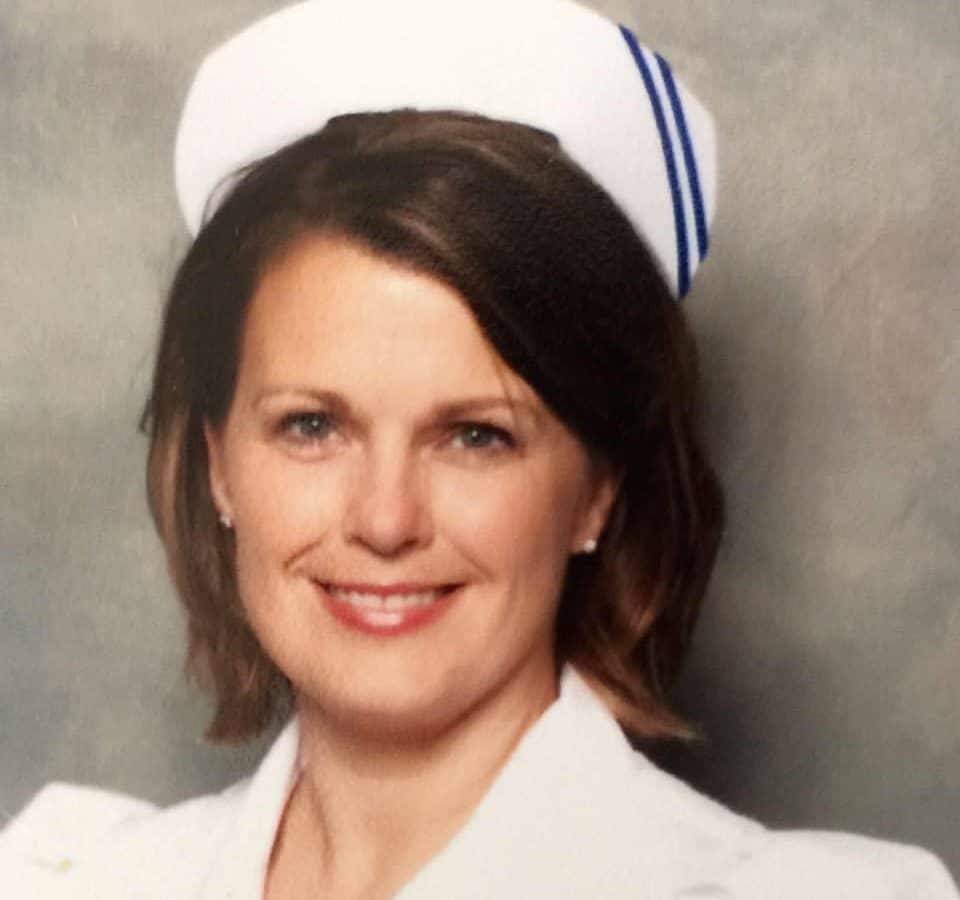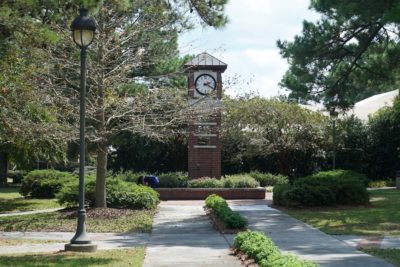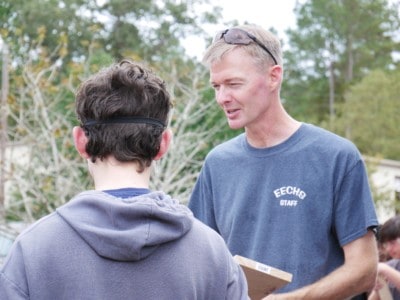
Crystal Way is a wife and mother. She’s a student. She’s an educator. And, she’s a nurse in these challenging times during the COVID-19 pandemic.
A graduate of Central Carolina Community College (CCCC) who currently is a Nursing Instructor in the CCCC Louise L. Tuller School of Nursing, she also continues to work in the FirstHealth of the Carolinas Moore Regional Hospital Emergency Department.
The COVID-19 pandemic
What has life been like for Way in a world where coronavirus has changed the landscape?
“During the COVID-19 pandemic, things have felt a little like they are being pulled directly out of a science fiction movie. As a provider, I have struggled with my desire to be in my field and help my fellow providers, while juggling concerns that each shift places my family and myself at risk,” said Way. “It has not changed my preparation for exposure, but it has put a new spin on it. Each time you enter a room with a COVID-19 rule out, it is hard to determine who is more stressed, the nurse or the patient. I am scared for them as much as I am for myself.”
Way notes that she is limited in how much time she can spend at the hospital due to census requirements.
“When I can get my hours on the unit, I can say the atmosphere is a little stressful,” said Way. “There will always be a special rhythm to the emergency department, but now there is added concern with lack of evidence to determine the best course of treatment, changing guidelines on who is allowed to be tested, and concerns about protective equipment needed to protect everyone being readily available.”
Way notes that working in the Emergency Department has mentally prepared her for the potential of exposure.
“There are always risks of exposure to things outside of COVID-19, all equally as distressing, and some of them riskier exposures. In our unit, you should always be prepared for the unexpected,” she said. “From a professional standpoint, nurses should always prepare by gathering knowledge to prepare themselves for the task at hand. I spend a lot of my time reading materials that are sourced from journals about the things we do know about the virus, things that we know do and do not work, and suggestions of where we go from here. There is not an option to refuse to treat, and the only way to be prepared to treat is obtain adequate, scientifically-based knowledge. … I cannot afford to be afraid, so I choose to be ready.”
Way recognizes the support that all healthcare professionals have received during the COVID-19 pandemic.
“I know that with or without the outpouring, I will be there for patients and co-workers, but I am humbled at the appreciation that the community has shown for our healthcare workers. It is always heartwarming to know that someone appreciates what you do. It is also heart-wrenching because a lot of the people that are going above and beyond are sometimes positioned to lose so much, and despite that give anyway,” said Way. “There is something redemptive about the human spirit in times of trial. It is encouraging to know that our efforts to keep this under control are not in vain in an age when so many things have gone unnoticed.”
There are her patients … then there are her three children.
“For my children, I spend a lot of my time trying to help them navigate their current normal. It has been difficult for them to bring their social lives to a screeching halt,” she said. “There are a lot of things that I think they are coming to understand that they may have taken for granted prior to the quarantine. We have talked more, laughed more, cooked more, and walked more together that maybe we have in an exceptionally long time.”
Teaching in the COVID-19 environment
Besides her roles as a nurse and a mother, Way also has her CCCC students to consider as COVID-19 has changed much instruction from in-person to online.
Way says that the nursing course was already designed to present a predominant portion in an online environment with the textbook package and student supplemental resources being web-based.
“Our students are also required to purchase laptops for that reason, and are actively engaged in the online environment. Our biggest challenge was moving to a web-based synchronous environment and redesigning or enhancing our presentation content to encourage active student engagement,” said Way. “Most of our students can verify that even in a seated classroom, there is not much idle time. Our program requires substantial preparation before class time to allow us to take the students through steps to making accurate clinical decisions and begin the process of applying their knowledge to real-life situations.”
Way noted that addressing individual student concerns in an online setting versus a traditional classroom has become easier because it has removed the formality of the office setting. “There have been many opportunities to get to know the student on a more personal level when they meet you in a more casual setting, and they are more willing to reach out to clarify content when they do not have an expectation that others are listening,” she said. “All of our students have done a phenomenal job of making this transition with us and embracing what we hope is a temporary normal.
“If this experience has taught us anything, it has exemplified the value of the human connection and why the Art of Nursing is just as valuable as the Science of Nursing.”
Working her way to becoming a ‘hero’
“Crystal is truly a HERO in the profession of nursing!”
That’s how Barbara Campbell, CCCC’s Chair of the Louise L. Tuller School of Nursing, describes Crystal Way. She should know. Campbell has known Way as both a student — and as her supervisor as a nursing instructor.
Way began her CCCC education in 2014 — but her educational journey began before that time.
“Life circumstances sometimes interfere with our greatest plans, and when I came to CCCC, I was determined that I would finish the journey that I had started nearly two decades before,” said Way. “While enrolled in nursing school, I was also enrolled to complete an Associate in Arts. This was one of my personal goals for many reasons.” She completed her CCCC education in May 2016.
Prior to her CCCC graduation, Way received multiple offers before accepting a position in the FirstHealth Moore Regional Hospital Emergency Department. While employed with FirstHealth, Way has been able to obtain and maintain Advanced Cardiac Life Support (ACLS) and Pediatric Advanced Life Support (PALS) certifications. She has also been able to obtain a valuable TNCC (Trauma Nursing Core Course) certification.
In January 2019, Way left Moore Regional as a full-time employee to take a position at WakeMed-Cary Campus to gain experience in a Level 3 trauma center. She worked there full-time until the end of August 2019, while she continued to work part-time with Moore Regional, when she accepted a CCCC nursing instructor position. During these transitions, she has maintained PRN employment in the Emergency Department at Moore Regional.
She completed her Bachelor of Science in Nursing degree from East Carolina University in 2018. In January 2020, Way began work on her Master of Nursing Education degree at East Carolina University.
Nursing as a profession
To say that Way enjoys nursing as a career may be an understatement.
“Nursing is such a dynamic field. In just a few short years, I have been a student, a new-to-practice nurse, and an experienced Emergency Room nurse. That transition has enhanced my knowledge of my field, but has also given me the skills to move into a position to foster that same potential in other nursing students,” said Way.
“I am encouraged and inspired by the other professionals that I have had the pleasure of working with and learning from. I also adore the ever-changing quality of the field of nursing because things cannot stay stagnate long if there is a way to improve the outcomes for our patients. But, truthfully, the most awe inspiring thing about this field is that I get to be the anchor in what is sometimes the ‘worst storm’ of someone’s life, and I am able to provide comfort, caring, and knowledge to them and their families. There will always be a time when the fight will not be won, but there will never be a time when I will not give my patients everything that I possess to prevent it from happening. I love that I can be there to calm their storm,” she said.
Way says that one of the most challenging parts of being a nurse, especially in an Emergency Room setting, is realizing the extent of what cannot be controlled. “We see a lot of really bad stuff come through our doors, and we handle it with very little warning. However, it is equally as distressing to treat a patient that comes to our department with few personal resources or knowledge about their health condition and know that they are far better off in the hospital where someone can help them versus at home,” said Way.
“There are so many struggles of the human spirit that are not seen by the average person walking by. These are things that your heart cannot unsee. Self-care in response to our patient’s circumstances often wears on our soul and can be difficult to recover from.”
CCCC: As a student and instructor
Way has known Central Carolina Community College both as a student and now as an instructor.
“CCCC has created a warm, welcoming environment. That applies to student and faculty populations,” said Way. “As a student, I was encouraged to excellence by faculty, and as a faculty member I can truthfully say the same thing. My time here as a student was comfortable yet challenging, but always engaging. There is a great community feeling at CCCC that remains open and inviting.”
What advice does she have for someone who may be considering CCCC to continue their education?
“I encourage them to remain open to the benefits of being in a smaller, more personal setting to start their journey into higher education. This environment is flexible to lifestyles and life obligations. It is well suited to the traditional student, but is equally beneficial to the non-traditional adult learner,” said Way. “CCCC offers traditional and hybrid courses to make degree completion possible and has an ever-evolving Distance Education program to fit everyone’s needs. CCCC remains student success focused and encourages excellence in student and faculty populations and strives to be innovative in its response to community needs.”




